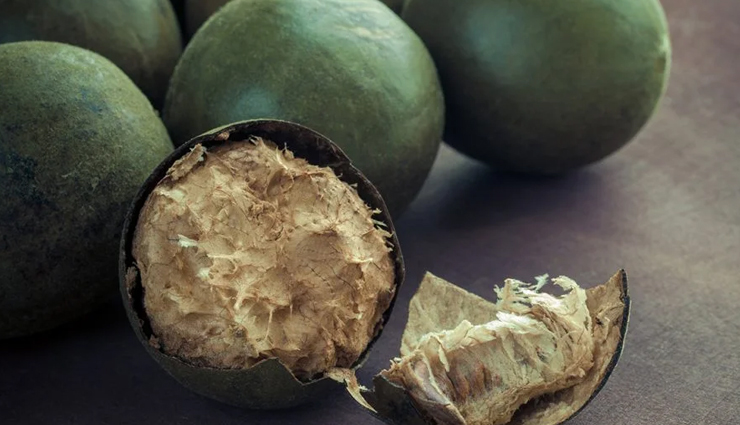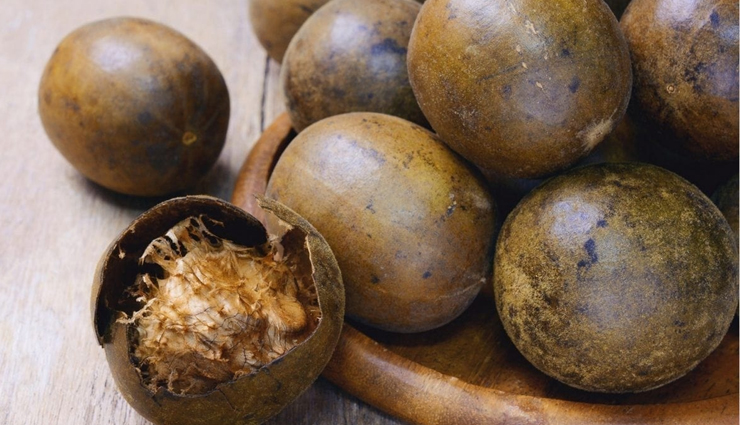- Home›
- Healthy Living›
- Monk Fruit: Nutrition, Benefits, And Side Effects
Monk Fruit: Nutrition, Benefits, And Side Effects
By: Priyanka Maheshwari Mon, 04 Sept 2023 6:40:14

Monk fruit, a small, unassuming green gourd hailing from the lush regions of southern China and Thailand, has garnered significant attention in recent years for its remarkable sweetness without the caloric baggage of traditional sugar. This exotic fruit, scientifically known as Siraitia grosvenorii or Luo Han Guo, has not only tantalized taste buds but also sparked interest among health-conscious individuals, diabetics, and those seeking alternatives to refined sugars.
In this comprehensive exploration of monk fruit, we delve into its nutritional profile, potential health benefits, and considerate examination of any possible side effects. From its centuries-old history as a natural remedy in traditional Chinese medicine to its modern role as a coveted sugar substitute, monk fruit's story is one of sweet intrigue and growing popularity in the world of nutrition and wellness.

What Is Monk Fruit?
Monk fruit, scientifically known as Siraitia grosvenorii or Luo Han Guo, is a small, green gourd-like fruit native to southern China and parts of Thailand. It has been used for centuries in traditional Chinese medicine and as a natural sweetener.
The key characteristic that sets monk fruit apart is its intense sweetness, which comes from natural compounds called mogrosides found in the fruit. These mogrosides are several hundred times sweeter than sucrose (table sugar), making monk fruit extract a potent sugar substitute.
Here are some key points about monk fruit:
Natural Sweetener: Monk fruit extract is used as a sugar substitute and is often added to foods and beverages to provide sweetness without adding calories or significantly affecting blood sugar levels. It is particularly popular among individuals looking to reduce their sugar intake, including those with diabetes.
Zero Calories: Monk fruit extract contains no calories, which is a significant advantage for those seeking a low-calorie or zero-calorie sweetener option.
Low Glycemic Impact: Monk fruit sweeteners have a negligible effect on blood sugar levels, making them suitable for people with diabetes or those following low-carb diets.
No Bitter Aftertaste: Unlike some other non-nutritive sweeteners like stevia, monk fruit extract is known for having little to no bitter aftertaste, making it more palatable to many individuals.
Natural Origin: Monk fruit sweeteners are derived from the fruit itself, and the extraction process typically involves crushing the fruit, juicing it, and then concentrating the juice to isolate the mogrosides responsible for sweetness.
Use in Cooking and Baking: Monk fruit sweeteners are available in various forms, including liquid extracts and granulated versions, making them suitable for both cooking and baking. They can be used as a one-to-one replacement for sugar in many recipes.
Health Benefits: Monk fruit is sometimes associated with potential health benefits, including antioxidant properties and anti-inflammatory effects. However, more research is needed to confirm these claims.
Safety: Monk fruit sweeteners are generally recognized as safe (GRAS) by regulatory authorities like the U.S. Food and Drug Administration (FDA). They are considered safe for most people when consumed in reasonable amounts.
Monk Fruit: Nutrition Facts
Calories: Monk fruit extract is virtually calorie-free, containing approximately 0-5 calories per 100 grams, which makes it an excellent choice for those looking to reduce calorie intake.
Carbohydrates: Monk fruit extract primarily consists of carbohydrates, mainly natural sugars. However, it is important to note that the sugars in monk fruit are primarily fructose and glucose, which are not absorbed by the body. Therefore, monk fruit extract does not significantly impact blood sugar levels and is suitable for individuals with diabetes.
Fiber: Monk fruit extract contains minimal to no dietary fiber.
Protein: Monk fruit extract contains negligible amounts of protein.
Fat: Monk fruit extract is virtually fat-free, containing minimal amounts.
Vitamins and Minerals: Monk fruit extract is not a significant source of vitamins or minerals.
Health Benefits of Monk fruit
Zero Calories, Zero Guilt: One of the most notable advantages of monk fruit is that it's virtually calorie-free. For those seeking to reduce calorie intake or manage their weight, monk fruit serves as an excellent sugar substitute without compromising on sweetness.

Blood Sugar Control: Monk fruit extract doesn't raise blood sugar levels, making it an ideal choice for individuals with diabetes or anyone aiming to maintain stable blood sugar levels. Unlike sugar, monk fruit won't lead to sugar spikes or crashes.

Potent Antioxidant Properties: Monk fruit contains powerful antioxidants called mogrosides. These antioxidants help combat oxidative stress and cellular damage, potentially reducing the risk of chronic diseases and promoting overall health.
Anti-Inflammatory Effects: Emerging research suggests that monk fruit may possess anti-inflammatory properties. Reducing inflammation in the body can have a profound impact on health, potentially lowering the risk of various conditions related to chronic inflammation.

Weight Management: Monk fruit's calorie-free nature makes it an attractive option for individuals looking to shed pounds or maintain a healthy weight. It allows you to enjoy sweet-tasting foods and beverages without the added calories.

Oral Health: Unlike sugar, monk fruit does not promote tooth decay or gum disease. It's a tooth-friendly sweetener that can be included in oral care products, making it a valuable option for maintaining dental health.

Ideal for Ketogenic and Low-Carb Diets: Monk fruit is keto-friendly and suitable for low-carb diets. Since it does not impact blood sugar levels or insulin, it can be used as a sugar substitute in various low-carb recipes.
Allergen-Free: Monk fruit is generally considered safe for individuals with food allergies. It does not commonly trigger allergic reactions, making it a reliable choice for those with sensitive immune systems.
Low Glycemic Index: With a glycemic index (GI) of zero, monk fruit doesn't cause rapid spikes in blood sugar. This makes it a valuable sweetener for individuals aiming to manage their GI levels.

Potential Anti-Cancer Properties: Some preliminary studies suggest that mogrosides in monk fruit may possess anti-cancer properties. While more research is needed, this intriguing possibility highlights the fruit's potential for promoting health and preventing diseases.

Side Effects of Monk Fruit
Gastrointestinal Distress:
One of the most common side effects of consuming monk fruit, particularly in excess, is gastrointestinal distress. Some individuals may experience symptoms such as bloating, gas, diarrhea, or stomach cramps. This is often attributed to the mogrosides in monk fruit, which can have a laxative effect when consumed in large amounts.
Allergic Reactions:
While rare, some individuals may be allergic to monk fruit. Allergic reactions can manifest as skin rashes, itching, hives, or even more severe symptoms like difficulty breathing and swelling of the face, lips, tongue, or throat. If you suspect an allergic reaction to monk fruit, seek immediate medical attention.
Headaches:
Some people have reported experiencing headaches after consuming products containing monk fruit extract. While this reaction is not common, it is essential to be mindful if you are sensitive to certain food additives or sweeteners.
Gastroesophageal Reflux (GERD):
Individuals with gastroesophageal reflux disease (GERD) may find that monk fruit exacerbates their symptoms. The intense sweetness can sometimes trigger acid reflux or heartburn in susceptible individuals.
Interactions with Medications:
Monk fruit's potential impact on drug metabolism has not been extensively studied. However, it's advisable to exercise caution if you are taking medications. Some compounds in monk fruit could theoretically interact with certain drugs, although this risk appears to be low.
Pregnancy and Breastfeeding:
Pregnant and breastfeeding women should consume monk fruit in moderation and consult with a healthcare provider before adding it to their diets. While there is limited research on the effects of monk fruit during pregnancy and lactation, it's best to err on the side of caution.
Blood Sugar Concerns:
While monk fruit does not significantly raise blood sugar levels, individuals with diabetes should monitor their glucose levels when trying new foods or sweeteners. Individual responses can vary, and it's essential to ensure that monk fruit does not adversely affect blood sugar management.





